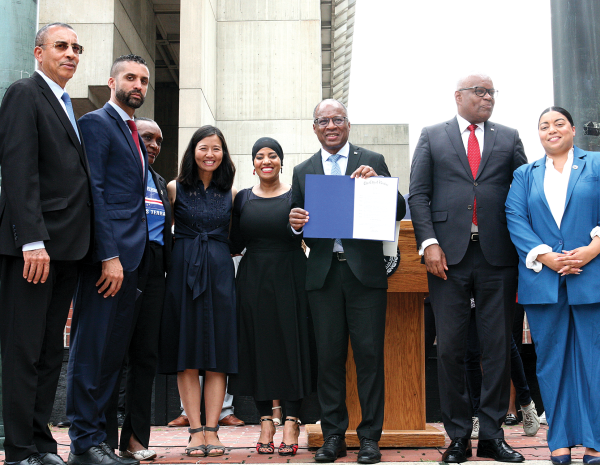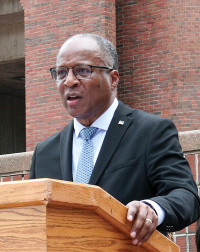July 10, 2024

Prime Minister José Ulisses Correia e Silva, middle, with other Cape Verdean dignitaries, Mayor Michelle Wu, and Cape Verdean American elected officials state Sen. Liz Miranda and Boston City Councillor Tania Fernandes Anderson. Seth Daniel photo

Cape Verdean Prime Minister José Ulisses Correia e Silva spent part of his time in Boston and New England last week urging more tourism and investment in his country by those with ancestral roots in the island nation, but also by the larger African American communities here in the United States.
The prime minister sat down with The Reporter for an interview at the Quincy Marriott on July 5 ahead of a busy day of visits in Dorchester and beyond.
Silva, 62, has been prime minster since 2016. The centrist Movement for Democracy party that he leads won a second five-year term in 2021. A former mayor of the nation’s capital, Praia, he comes from a business/finance background and governs in tandem with President Jose Maria Neves, who visited Dorchester last year.
An archipelago off western Africa, Cape Verde has about 500,000 people living on its eight main islands, but more than one million in the diaspora, which has communities in Brazil, Netherlands, and Argentina but is most concentrated in Massachusetts, particularly Dorchester.
July 5 is celebrated as Cape Verde’s Independence Day, marking the day 49 years ago when it became self-governing after many years of control by Portugal.
“It is particularly important to be here for the diaspora,” Silva said in the interview, “in Massachusetts and particular in Boston. We have an important community, and they participate in political activities and economic affairs in the United States. They are well integrated here; they are Cape Verdean and American. That’s why one part of Cape Verde is the United States, too. That’s why we are very interested to be very close to our communities.”
Cape Verdeans in the US can register to vote and participate in Cape Verdean elections, and the 72-member parliament includes two representatives dedicated to the United States, making the diaspora important despite the 3,300-mile separation.
A recent problem, though, has been getting the diaspora and American tourists to visit the islands, which are tropical, safe, and a popular destination for European travelers. While in the past, the state airline, Cabo Verde Airlines (TACV), had direct flights from Boston, that is no longer the case. Any trip now connects through Portugal and can take days instead of six hours.
Silva wants that to change this year.
“I am very interested in having a direct flight from Boston to Cape Verde, to Praia,” he said. “If we can interest JetBlue to fly to Cape Verde, naturally that will increase the possibility of having more Americans in Cape Verde for tourism and other activities.”
Silva hopes that such flights will open the door to not just more Cape Verdean Americans visiting. “We need more Americans to go to Cape Verde to invest, more tourists, and particularly Afro-American,” he said.
“I’m going to create a special program because they need to know about Cape Verde. In history, Cape Verde was a platform for slave trading. This platform was very linked to the United States and Brazil…African descendants must know that one part of their history is in Cape Verde. I’m very interested in that.”
Cape Verdean Americans have been generous in sending money back home – known as remittances – over the decades. Now, Silva said, they would like to attract more traditional investment from the diaspora in sectors like real estate, tourism development, the digital economy, and agriculture.
“We approved a special statute to encourage diaspora investors,” he noted. “They have good incentives, low taxes, and facilities in terms of land to invest in. The only condition is to create. Now is the moment to attract more.”
Yet, he said, what is more important is “human capital.” He said the diaspora in Dorchester and New England “integrated very well” and is represented in all sorts of economic sectors. He hopes they will consider returning home to lend their experience and competence to Cape Verde in a multiple number of ways.
He illustrated the possibilities by discussing using sports and noting that Cape Verde, though small, often competes above its weight limit in soccer (futbol), handball, and basketball and has shown the ability to beat larger opponents.
“You know why? It’s because we [have talent] in the United States, Portugal, Spain, France, Netherlands – athletes and players with double nationality,” he said with a smile. “Most of them were born abroad and played for our national team. That’s why we understand Cape Verde is not just 500,000 people, but more than that. If we do it in futbol, in basketball and handball, we can do it in business, in medicine, and all the areas to amplify…human capital for our nation.”
A side issue that has involved a great deal of discussion in the diaspora is the push to make Cape Verdean creole, known as kriulu, the official language. Portuguese is the official written language of the government, but most residents speak kriulu in a variety of dialects that vary by island. In Dorchester, younger Cape Verdeans and those who were born here or immigrated in the 1970s or 1980s have made a push to learn kriulu as a way to reintegrate with their culture. That’s a problem that doesn’t exist in Cape Verde, of course, but one that isn’t lost on Silva.
“We’re working on that,” he said. “What we need to continue to do is look at the second generation. They don’t speak Portuguese, but they speak creole and understand creole…We need to maintain to keep their identity of Cape Verdean.”
As for it becoming the “official” language of the islands, that’s a more complicated than a government proclamation. While the country is making efforts to introduce kriulu into the education system, it can be controversial when it’s put in writing for textbooks and within the court system – which are now in Portuguese. And which island dialect would be the standard? That’s not an easy discussion, Silva said, again with a smile.


